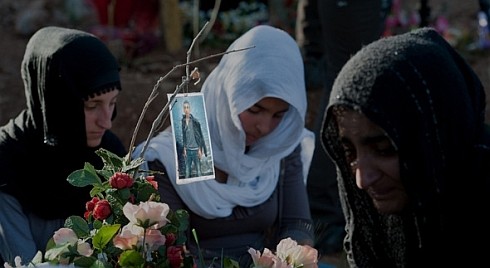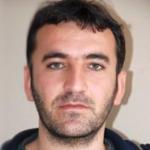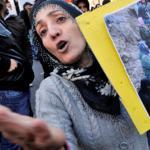
December 28 marked as the first anniversary of Roboski Massacre, where 34 Kurdish civilivians on the southeastern border lost their lives after a Turkish military air strike. While the official investigation has yet to transform into prosecution, the beloved ones of Roboski victims demand justice.
December 28, 2011: Television channels broke the Roboksi news almost 12 hours after the air strike. In a statement, Turkish Army said: "A paranormal activity has been detected on our border where terrorists frequently use a gateway. Targets have been bombarded between 9:37 PM and 10:24 PM."
December 29, 2011: PM Erdogan made his first statement concerning the air strike: "We have seen similar border activities where they were smuggling arms prior to massive terrorist raids. The public had demanded then why we hadn't intervened them. This is what what we did now."
Roboski victims' funerals were held. AKP Deputy Chair Hüseyin Çelik said the air strike was an "operational accident".
December 30, 2011: PM Erdogan congratulated the military staff for the sensitivity on the issue "despite the media".
January 3, 2012: A massive group of human rights activists, union members, doctors and lawyers headed to Roboski village. According to their report on the trip, they said: "Some of the victims froze to death due to lack of first aid."
January 9: A military investigation has been Lauched where Gendarmerie Colonel Hüseyin Onur Güney was suspended from duty. Another 17 active duty army staff has been prosecuted for allowing border smuggling. 5 individuals were arrested for attempting to murder Uludere district governor Naif Yavuz.
Roboski survivors prosecuted
January 11: The Turkish Parliament formed a special commission to investigate the killings in Ortasu village, the officially recognized name for Roboski.
January 16: Roboski massacre survivors Davut, Servet and Hacı Encü testified for passport law abuse, illegal border-crossing and smuggling charges at a local military base in Gulyazi.
January 26: Pro-Kurdish Peace and Democracy Party filed a lawsuit the case against the Turkish government at ICC.
February 4-6: Parliament commission members held a field investigation in Roboski.
February 16: Some commission members protested the army's action after watching drone recordings on the day of the incident.
March 1: "The army didn't bomb Roboski people on purpose," said Deputy Prime Minister Bülent Arınç.
March 6: An army electronics industry institution report submitted to the commission confirmed Arınç's remarks.
Commission chair: We hope to finish our report by May
April 5: Defense Ministry submitted the parliament commission a report whose was not disclosed saying that a Diyarbakir special prosecution office and another Uludere district court issued a media coverage ban.
Ertuğrul Kürkçü, a commission member, told bianet that the report did not include any information "worth un-disclosing".
April 6: A delegation of parliament deputies from different political parties received the family members of 34 Roboski victims at the parliament in Ankara.
"We are hoping to finish our report by the end of the month. We are currently expecting an investigation report from Interior Ministry," İhsan Şener, the Uludere commission chair, said.
April 30: "Either the information was sent from a second drone or coordinates taken from F-16 jets was used or the information was given from a third country," the interior ministry report regarding how the air strike accident might have happened.
WSJ: U.S. Army provided the information
May 16: The Wall Street Journal claimed that the information leading to the air strikes in Roboski was provided by a U.S. Army drone.
May 18: Turkish Army denied the WSJ article, saying that the information was provided by a Turkish drone.
After PM Erdogan's denial of the allegations, WSJ published a second article denying the denials and saying that its news source was an official from U.S. Secretary of Defense.
May 19: Turkey's main opposition party leader Kemal Kılıçdaroğlu complained the AKP governement's failure to address the drone turmoil.
PM: "WSJ article is a hoax"
May 21: PM Erdogan reiterated that WSJ article was a hoax and the information leading to air strikes was provided by a Turkish military drone.
May 22: "It is clear that the information was provided by our national sources. I don't personally think that we need to discuss on the issue anymore," Deputy Prime Minister Bekir Bozdağ said.
The Turkish Army said it launched an official investigation on the issue.
Main opposition party deputy Mahmut Tanal filed a lawsuit against President Abdullah Gül, PM Erdogan and Army Chief Necdet Özel for their involvement in the Roboski Massacre.
May 23: Interior Minister İdris Naim Şahin said the air strike order was given by Turkish Air Force generals in Ankara.
May 25: "Whoever is still bringing up the Uludere issue is actually related to terrorist organizations," PM Erdogan said.
Police brutality on Roboski protest
May 27: Defense Minister Ismet Yilmaz made his first comment on the issue, expressing his ministry's reluctance to comment due to a potential influence on the investigation.
June 28: Hundreds of protestors in Roboski became subject to police violence as they were heading to zone where the killings took place.
Prosecution office confirmed WSJ
August 5: The Diyarbakir prosecution office investigating the Roboski Massacre confirmed the WSJ article, saying that civilians could be distinguished from drone recordings.
August 16: Ferhat Encü, who lost 11 family members in Roboski Massacre, has been detained by the police for a sixth time due to IT issues in the criminal database.
August 21: In Uludere district, a minivan accident left 9 Turkish troops and a civilian driver dead. Roboski victims' families gave the first aid to many wounded troops.
October 12: Ferhat Encü filed a lawsuit against the police officers for detaining him sixth times under false pretensions. The court rejected the case saying that he was still facing prosecution from another case.
Kürkçü: The military operation encompassed several contradictions
December 6: Several intellectuals launched "signatures for Roboski", a campaign aimed at the prosecution of government officials and a formal state apology.
December 10: "Roboski Massacre is an extension of a military operation called "Star Air Squad" which was launched by the 23. Gendarmerie Border Brigade," Peace and Democracy Party deputy Ertuğrul Kürkçü told bianet.
Kürkçü claimed that the military operation encompassed several contradictions per se. "The Turkish Armed Forces officers say that the operation was initiated to prevent PKK's border abuses. However, the 23. Gendarmerie Brigade made a statement saying that the operation was held after an information concerning incoming PKK militants from the border. And no official order proves this statement."
Şener: The air strike order might be given by Turkish Army
December 26: Uludere commission chair Ihsan Şener said the Turkish Army might have given the order of the air strike that led to the death of 34 people. He further added that it might be a mistake but with no bad intentions.
"The Turkish Army did not share all the confidential documents with the commission," Şener said. "We would actually publish our report by the anniversary of Uludere incident but decided to extend it to January."
In response to Şener, Kürkçü said that only the government is officially in charge of off-border military operations. "If the army orchestrated such operation, it should have had the government's consent." (AS)







